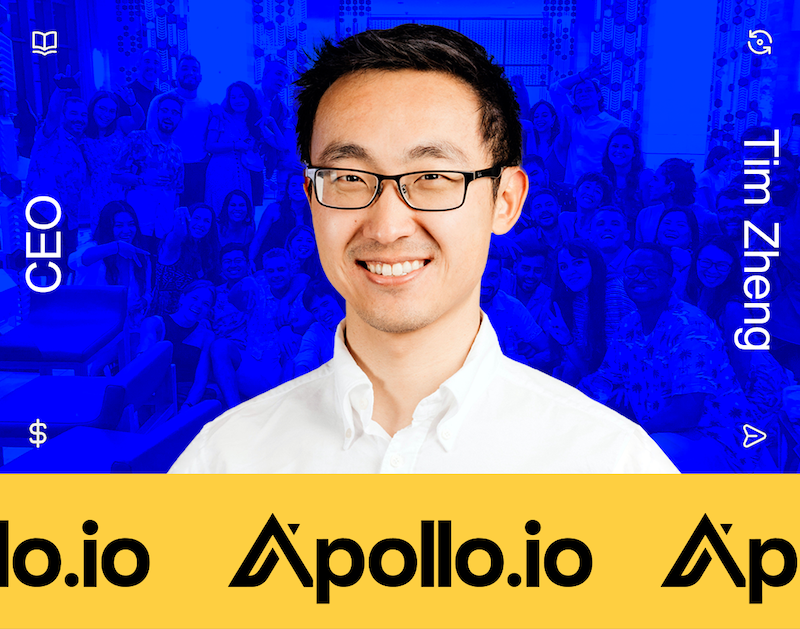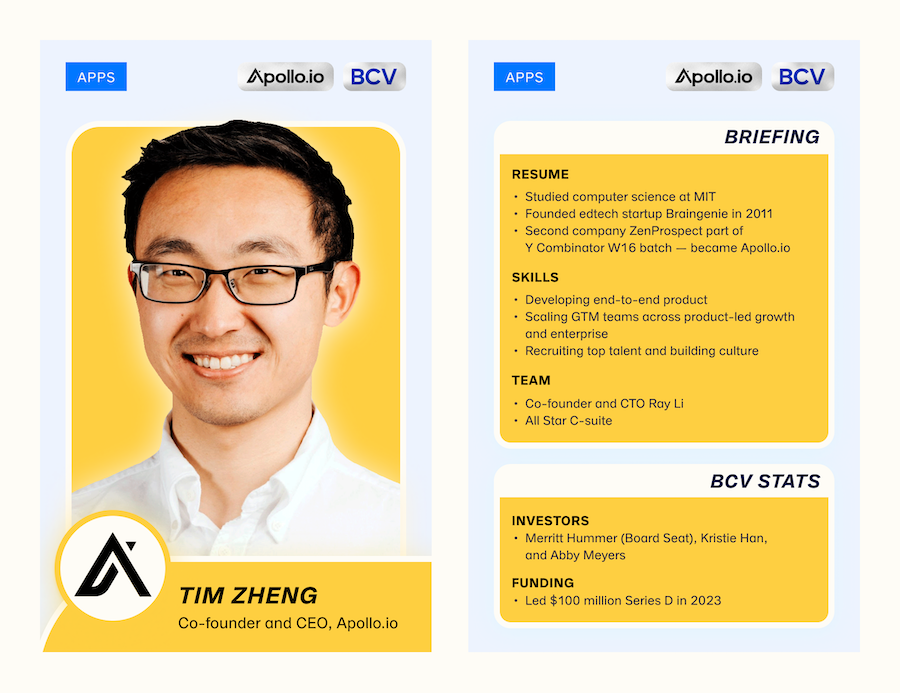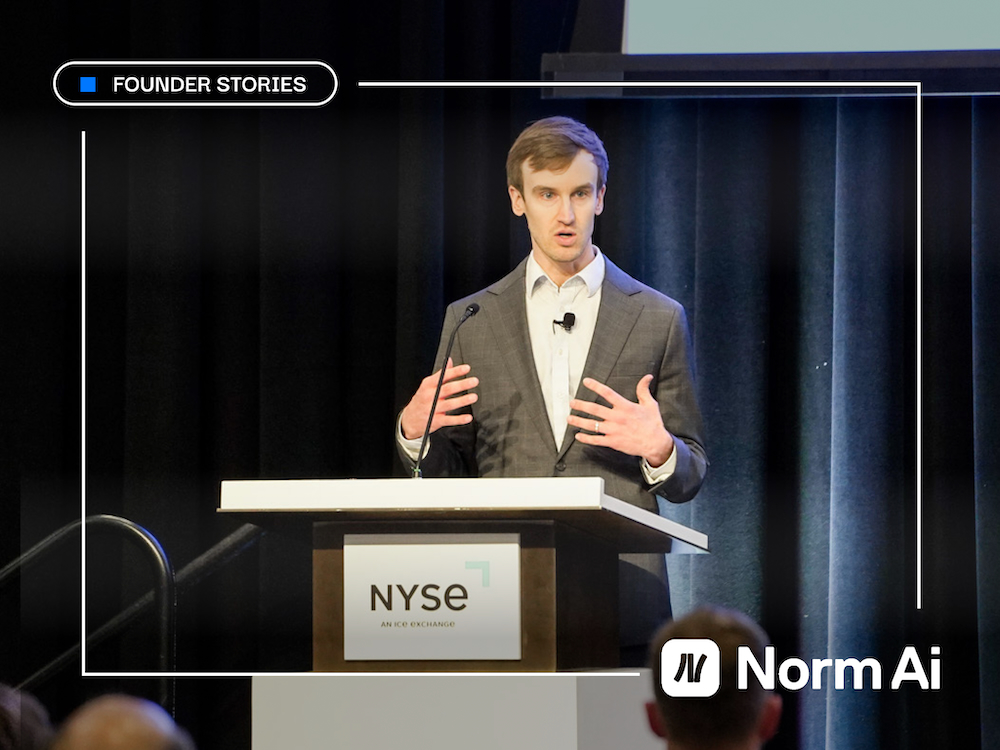

How Apollo.io Is Helping Every Company Reach Its Full Revenue Potential
With a comprehensive, product-first approach, Apollo.io is positioned to become this generation’s premiere sales platform.
It’s one thing to build a great product. It’s quite another to sell it.
That’s something that Tim Zheng discovered early in his entrepreneurial career. A software engineer by training, he discovered early on that the way the company goes to market is just as important – and just as difficult – as building something customers want.
This ultimately led Tim and his co-founder Ray Li to create Apollo.io, a comprehensive platform that combines the industry’s largest and most accurate database of B2B sales leads with best-in-class sales execution tools. Apollo employs a product-led growth (PLG) strategy, leaning into Tim and Ray’s engineering backgrounds to focus on speed and efficiency.
“Our vision is: Imagine if every company can reach their full market potential,” Tim says. “I think that would be a really amazing world.”
That vision drew Bain Capital Ventures to lead Apollo’s $100 million Series D round, alongside our friends at Sequoia Capital, Tribe Capital, and Nexus Venture Partners.
Apollo is helping sales and marketing teams at companies — from startups to large enterprises — go to market more efficiently with best-of-breed sales execution tools built on top of the best B2B buyer data; all from a single, integrated platform that is more comprehensive and cost-efficient than many of its peers.
In a time of economic uncertainty, the sales department faces more pressure on its budgets than ever, driving companies to consolidate the number and cost of the software tools they use. We believe that Apollo stands out as an emerging leader in the sales tech ecosystem due to its superior sales intelligence tools and product vision of becoming an end-to-end platform, positioning it to become this generation’s premiere sales platform.
Meet the Founder: From engineering to sales enablement

Apollo’s product approach derives from Tim’s history as a founder and engineer. Tim’s previous startup was an edtech software company and while he and his team were proud of the product, the company hit a wall at around 5,000 users. They tried various commercial, off-the-shelf sales tools to help reach more customers, but they didn’t accelerate reach as Tim and Ray had hoped.
Ultimately, Tim decided that the right solution was for the company to build its own suite of go-to-market tools, from its own database of would-be buyers to software for helping salespeople manage each lead from first contact to the close of the deal. Their signups exploded, and they reached 150,000 users by the end of the fifth week.
In talking to friends and colleagues, Tim found that his problems with existing sales software were very common, and the solution that he had built was something others would be willing to buy. Tim recruited Ray as his co-founder and CTO, and in 2015, Apollo was born.
Tim says that the engineering-first lens has served Apollo well over the years: The company maintains its PLG approach, constantly iterating on and improving the product. Tim and Ray retain an outsider’s perspective on the sales industry and are not beholden to conventional wisdom around traditional best practices.
Apollo prides itself on building new features faster and more efficiently than its rivals, passing the savings on to users. Customers get a robust set of sales enablement tools, plus a prospecting database with over 270 million records, for less than it would cost to buy each part of the platform separately from other vendors.
Apollo focuses on shipping at a steady pace, ensuring that each piece of the product is always getting better. That attitude and emphasis on speed permeates the organization, with Tim crediting it for helping Apollo stay one step ahead of competition.
“According to people who work here, we have strong operating cadences and rhythms,” Tim says, noting that when they see a feature that others may think requires 200 engineers, they can approach it with just 10 and complete the project in far less time. “I think we’re able to just build stuff way faster.”
How Apollo.io Works: Sales, from start to finish
Tim likens the incumbent sales solutions to building a car yourself from scratch. You have to buy every component, from the engine to the windshield wipers, and then assemble it yourself – or, more likely, hire a mechanic to do it for you. And then, even if it works, you’re likely to have paid a lot of money for a patchwork clunker of a car that’s neither fast nor fun to drive.
In comparison, Tim says that Apollo is the kind of car you’d actually want: “It just turns on, anyone can drive it. It’s way less expensive than anything out there, and it’s faster, it’s more delightful, simpler.”
It starts with Apollo’s database of sales leads with over 270 million records. Apollo’s flexible pricing model means that even startups can get access to high-quality sales data that was previously only accessible to large enterprises. It can also connect to CRM systems like Salesforce to help enterprise sales professionals manage existing leads.
Once a lead is identified, Apollo keeps the representative on track during the sales process. It can suggest the perfect wording for a pitch email, help write a sales call script, and set reminders to connect on LinkedIn with a personalized note.
Apollo’s engineering DNA also manifests in its workflow automation, which can simplify and streamline certain tasks. For example, if a prospect changes job titles or leaves a company, Apollo can catch it and automatically flag them for follow-up.
Returning to the car metaphor, Tim says that Apollo has invested a lot of technical work into making sure it was easy for a company of any size to get started. In its first incarnation, Apollo required custom work for every engagement, making it only suitable for larger companies.
After a major product overhaul, Apollo became completely self-serve, with a free tier that gives users their first glimpse of what the platform can do for their revenue operations.
While Apollo performs outbound sales, the vast majority of its users are finding it organically and getting started on their own. Those first users fall in love with the product and spread it to the rest of their teams, often returning to Apollo to buy larger subscriptions packages.
“Start with the absolute best product, and make sure it’s really easy to use and accessible, and customers can get value out of it without needing to talk to anybody,” Tim says. “So the product sells itself, for many of our users.”
What’s Next: Building the future of sales

The key to Apollo’s PLG approach is making sure that the product in question is always getting better. That’s why Tim says that Apollo is investing deeply in research and development, particularly when it comes to AI.
That might manifest in new ways to help salespeople accelerate their pipeline: Tim highlights how Apollo recently launched AI tools to help users generate the perfect pitch email and coach them on nailing their call scripts to get a prospect’s attention. It also recently introduced Buying Intent for lead scoring and to help sales reps identify exactly what, when, and how often prospects have shown intent to buy.
In its broader scope, Apollo is working on a more powerful set of data analytics tools, along with AI-powered engines to make sense of all the pertinent data.
That means forecasting sales trends, better opportunity tracking, identifying the right contact at each prospective customer, and even proactively making sure that managers are aware of what’s working and what’s not – “all the things that you need to do for sales instead of just generating pipeline,” as Tim puts it.
Tim expects that this kind of intelligence is going to prove game-changing for the entire sales industry. “Those who take advantage of AI to master their data and improve their sales process will outperform those who don’t,” he says.
“We do feel like the sales industry is going to turn on its head in the next couple of years. The amount of inefficiency that exists today is pretty mind blowing,” Tim says. “Apollo is here to fix that.”
Related Insights


MagicSchool’s AI-Powered Software Is Ushering in the Future of K-12 Teaching
MagicSchool founder Adeel Khan is a former teacher and principal whose AI platform is saving teachers time, fighting burnout, and helping schools build responsible AI experiences for students.

Norm Ai Is Using AI to Clean Up the ‘Sludge’ of Regulatory Compliance
John Nay, a founder at the intersection of AI and law, built Norm Ai as a solution to aid compliance officers in highly regulated industries.

